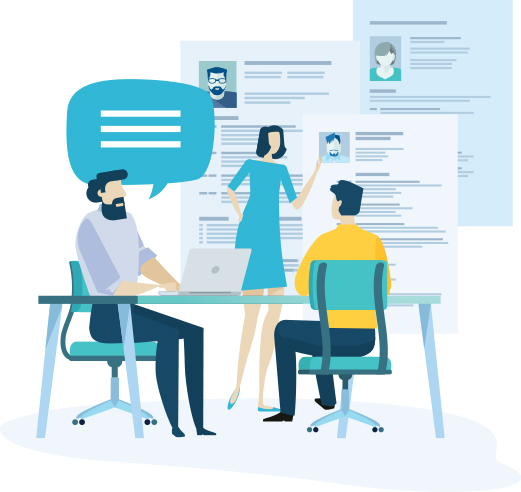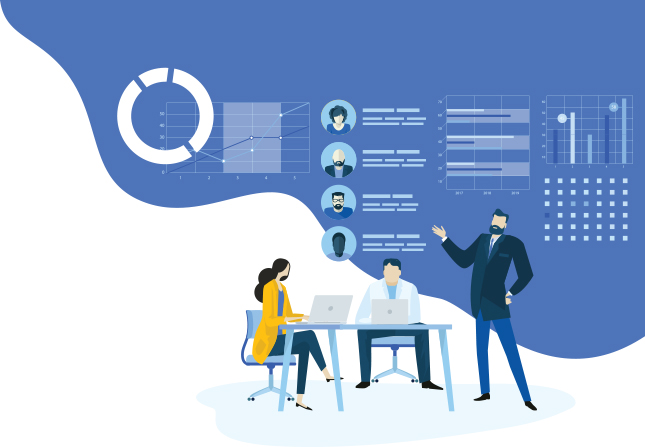HR Leaders have to drive the 'people' part of digital transformation
Read More
Digital transformation may attempt to change the way work is being done by introducing powerful digital solutions – but nothing will change on ground unless the workforce changes with it.
A key transformation that has taken place in the past decade is the evolution of HR into a strategic function.Today, digital transformation is presenting HR with an opportunity to prove that they are key strategic differentiators for the organization.

Is your Workforce ready for the Future Workplace?
Work is changing in ways that the world has never seen before.On the one hand,AI & advanced technologies are bringing in major transitions in occupations and shifting demand for skills...
READ MORE
EasyTalent Digital Competence &
Learning Ability Test (DCAL)
To hire those who possess the necessary digital competence and ability to learn, talent managers will require putting the job applicants through DCAL...
READ MORE
Raising Organizational Digital Competence is a crucial KRA of CHRO & TA Leaders
in era of Digital Transformation
One of the biggest considerations for HR leaders is to hire digitally competent people for future technology-rich work environments...
While it is the KRA of the CIO to ensure that the right digital technologies are implemented to enable digital transformation, it is an equally crucial KRA of the CHRO/HR Leaders to ensure that people have the right digital competence and ability to learn.
It is easier to measure the CIOs’ activities because technology deployments are physically quantifiable, but it is far more difficult to quantify the digital skills of people and the collective organizational digital competence.

The ODC Score can be used by HR leaders as a quantitative measure to report the level of digital competence and its improvement to the CEO and Board.
To support the digital transformations that are ongoing in organizations, HR leaders have a strategic responsibility to raise level of Organizational Digital Competence.
As an HR Leader you can raise ODC Score by:
1.Establishing your organization’s current level of ODC
2.Then, implementing measures to continuously raise the ODC
Step 1
Select a random sample of employees from each department/unit of the organization. The sample size could be about 10% of the size of the department/unit (the larger the sample the more accurate is the established ODC)
Step 2
Administer them the DCAL test (in anonymous mode so that they don’t feel threatened or hesitant)
Step 3
Total the scores obtained by all participants and divide that by the number of participants to obtain the average. This average number is the representative ODC of the organization at that point in time

Students, jobseekers, and existing employees can appear for the online EasyTalent DCAL test, and acquire their Personal DCAL Scores.
The Personal DCAL Score is a valid indicator of the individual’s digital competence as a whole, and in each of the five areas comprising the twenty-one competencies that make up holistic digital competence including awareness of digital technologies and the individual’s ability to learn and adapt to digital advances.
The Personal DCAL Score is indicative of the applicant’s digital competence and ability to learn.
Employers can also create customized DCAL assessments in EasyTalent that can validate applicants’ competencies in specific areas important to the organization.
To ensure test integrity and prevent impersonation, employers can have the candidates go through an Aadhaar authentication and facial matching (which are inbuilt into EasyTalent), prior to the DCAL test, and also have the entire DCAL test proctored to ensure integrity and prevent impersonation and cheating.

Because many digital natives and many young job seekers lack a specific skill that employers routinely need, which is "problem-solving in technology-rich environments”.
Young people today, who have grown up surrounded by technology toys and tools of all kinds, view technology more as a way to entertain themselves. Computers to them are portals to games, social media sites, and watching television programs.
And so, these young people have been less able to perform basic tasks on the computers. They are baffled as to how to create a folder, link files, do sorts, or create macros - all pretty basic stuff....all stuff that is required in the workplace.
”Research has shown that large amounts of computer, mobile and internet use only contribute to digital skills at the operational level. The higher cognitive ability for critical search and selection of information is not a consequence of higher consumption. Users can simply stay on the same level and only use some specific applications. Therefore, high consumption of technology as such should not be regarded as proof of digital competence”